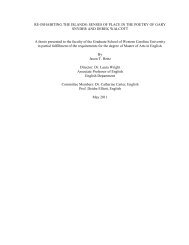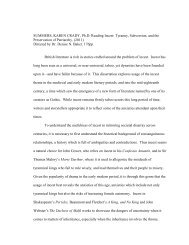Song Character Analysis Worksheet - The University of North ...
Song Character Analysis Worksheet - The University of North ...
Song Character Analysis Worksheet - The University of North ...
Create successful ePaper yourself
Turn your PDF publications into a flip-book with our unique Google optimized e-Paper software.
order while the musical number represents “romance, [a] rogue imagination,” fantasy,<br />
and “exercise for imagination and personal freedom.” 11 Martin Sutton described the<br />
suspension <strong>of</strong> realism and the <strong>of</strong>ten seemingly superficial need for production numbers as<br />
the following:<br />
<strong>The</strong> [musical] number functions as a narrative interruption, a fantastical tangent<br />
that at once frustrates and releases the spectator. <strong>The</strong> plot . . . surrounds,<br />
regulates, and keeps in check the voluptuous, non-realist excesses <strong>of</strong> the number.<br />
Plot thus takes the part <strong>of</strong> ‘super-ego’ to the unruly ‘id’ <strong>of</strong> the number. 12<br />
<strong>The</strong> hegemonic reaction is to applaud the logic <strong>of</strong> the plot while feeling “frustrated” (and<br />
yet liberated) by the imagination <strong>of</strong> the music.<br />
It is precisely the provocatively feminine elements <strong>of</strong> timbre and expression (the<br />
imagination) that allows a performance to become an individual interpretation, particu-<br />
larly in the art <strong>of</strong> singing. Roland Barthes described the “imaginery” in music with its<br />
function “to reassure, to constitute the subject hearing it (could it be that music is<br />
dangerous —the old Platonic idea? that music is an access to jouissance, to loss?).” 13<br />
This almost ineffable quality <strong>of</strong> performance invokes the ethos <strong>of</strong> music in the combi-<br />
nation <strong>of</strong> language and melody, termed by Barthes as the body or the “grain” <strong>of</strong> the voice.<br />
191.<br />
11 In Genre: <strong>The</strong> Musical, A Reader, ed. Rick Altman (London: Routledge & Kegan Paul, 1981),<br />
12 Sutton, 191. Note his use <strong>of</strong> descriptive words, particularly “voluptuous,” which have a<br />
feminine connotation.<br />
13 “<strong>The</strong> Grain <strong>of</strong> the Voice” (1972), reprinted in his collection Image, Music, Text, trans. Stephen<br />
Heath (New York: Hill & Wang, 1977), 179. “Jouissance” means enjoyment.<br />
86

















